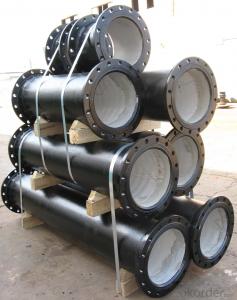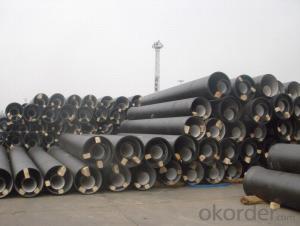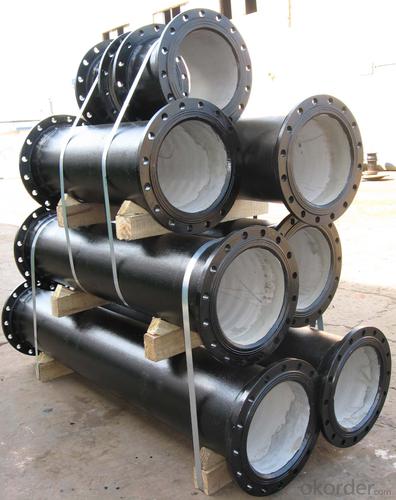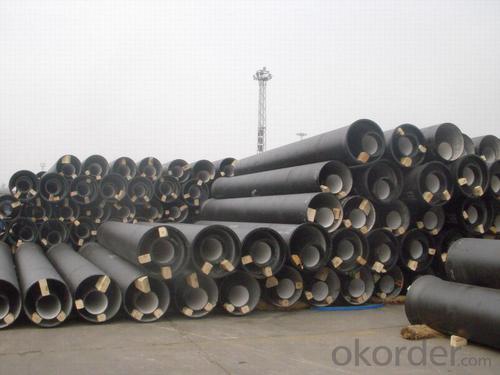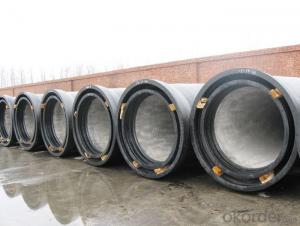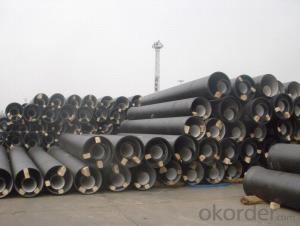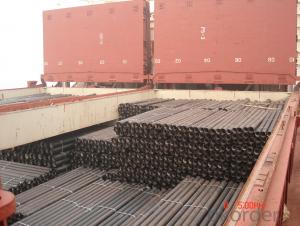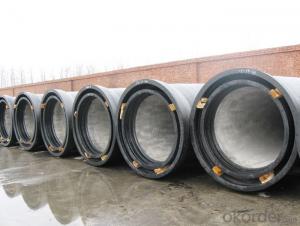Ductile Iron Pipe ISO2531 C CLASS DN1500
- Loading Port:
- China main port
- Payment Terms:
- TT or LC
- Min Order Qty:
- 20 m.t.
- Supply Capability:
- 50000 m.t./month
OKorder Service Pledge
OKorder Financial Service
You Might Also Like
1.Ductile Iron Pipe Description :
1) Pipes confirm to ISO2531,K9 class,T type joint,6m long,with inside cements lining conform to ISO4179, outside Zinc
spraying(130g/m2) and bitumen coating(70μm) conform to ISO8179.
2) Pipe ends: Spigot and socket ends, with 100% SBR rubber gaskets accoding to ISO4633
3) we can do third party inspection according to customer's request.
2.Main Features of the Ductile Iron Pipe:
1).Quality guarantee
• Chemical checking
• NDE after rough machining
• Mechanical testing after heat treatment
• Final NDE,dimension inspected
2).Quality document
• Full Q.A document as per client request
3).Packing and Shipping
• standard export package(carton/wooden case/pallet)
• accept FOB,FAS,CNF,CIF door to door etc or customer designated shipping agent
4).Service
• Drawing: we can translate your original drawing, offer best suggestion on design
• Quality: we have full set quality control system to guarantee the best quality.
• Inspection: inspect in house, all our products must be checked 3 times before packing
5)Inspection
• In-house Foundry
• Third party inspection available upon requirement
3.Ductile Iron Pipe Images:
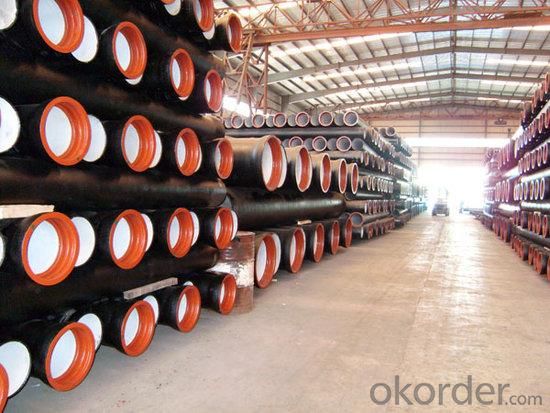
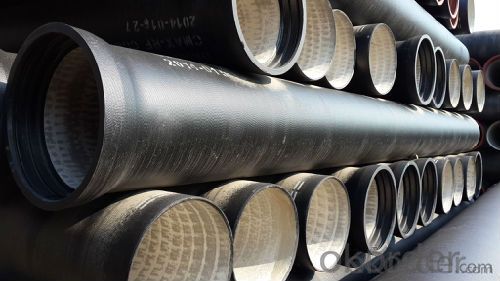
4.Ductile Iron Pipe Specification:
Surface Finishes: Bare, Oiled, Mill Varnish, Galv,FBE, FBE Dual, 3LPE, 3LPP, Coal Tar,Concrete Coating and Tape Wrap
End Finishes: Beveled, Square Cut, Threaded, hat
Additional Services: Internal Coating
Packaging: packed in bag, plastic bag, steel strip, steel wire,double wire, iron box, wooden box, tarpaulin, plastic
sheeting
Inspection: MOODY SGS BV GL DNV ABS LIOYD’S
Test: X-ray, UT, magnetic particle,inspection,hydrostatic test.
Processing service: Beveling, Threading, Slotting, Cut-to length, Bends, Quench and Temper, Fabrication, Double-jointing
and On-site assistance
Documentary: MTC, material certification,Origin certification, CI or PI,Test Report, export licence, handling order,
B/L,insurance policy,shipping instructions, contract, packing list etc.
5.FAQ:
We have organized several common questions for our clients,may help you sincerely:
1.Q: Why would you choose ductile iron pipe rather than other pipe materials?
A:The reasons are obvious for that not only ductile iron pipe possesses the inherent strength and flexibility of ductile
iron, combined with proven corrosion protection systems, but also the cost savings can be achieved from design to
installation and commissioning.
2.Q:Why can you guarantee the inner of pipes can’t be corroded?
A: High alumina cement mortar lining and sulphate-resistant cement mortar lining. These two special linings are applicable
to inner anti-corrosion for sewage pipes, improving resistance to erosion of the sewage components.
- Q: How does ductile iron pipe handle soil movements and settlements?
- Ductile iron pipe is known for its ability to handle soil movements and settlements effectively. The material's flexibility and durability make it suitable for accommodating ground shifts and settling without compromising its structural integrity. One key characteristic of ductile iron pipe is its inherent strength and resilience. It can withstand external pressures and stress caused by soil movements, such as lateral forces and ground settlement. This is due to its high tensile strength, which allows it to resist deformation and maintain its shape even under significant loads. Moreover, ductile iron pipe's flexibility plays a vital role in its ability to handle soil movements. The pipe's inherent flexibility allows it to absorb the effects of ground shifts and movements without fracturing or breaking. It can bend and adapt to changes in the surrounding soil, reducing the risk of pipe failure or leakage. Additionally, ductile iron pipe's joint design contributes to its effectiveness in handling soil movements and settlements. The push-on joint system used in ductile iron pipe installation allows for some movement and settlement without compromising the overall integrity of the pipeline. The joints can absorb and distribute stress and movement, reducing the risk of pipe failure. In conclusion, ductile iron pipe is highly capable of handling soil movements and settlements. Its strength, flexibility, and joint design allow it to withstand external pressures caused by ground shifts, settling, and other soil movements. This makes ductile iron pipe a reliable choice for various applications where soil movement is a concern.
- Q: What's the difference between cast iron pipe and steel pipe?
- Steel tube (Steel pipe) production technology development began in the bicycle manufacturing industry, the rise of the early nineteenth Century during the oil development, the two world war ships, boilers, aircraft manufacturing, manufacturing of power boiler after the Second World War, the development of chemical industry of petroleum and natural gas drilling and transportation, will effectively promote the the yield and quality of varieties, the development of steel tube industry.
- Q: Is the fire hose capable of using rapid repair joints?
- Installation joint. Insert the socket into the socket to coincide with the central axis of the pipe or pipe to be joined. Use a guide chain to tighten the pipe member until the pipe mouth enters between the two white lines.
- Q: How is ductile iron pipe tested for quality?
- Ductile iron pipe is tested for quality through various methods, including visual inspection, hydrostatic pressure testing, and mechanical property testing. Visual inspection ensures that the pipe is free from any visible defects or imperfections. Hydrostatic pressure testing involves subjecting the pipe to water pressure that exceeds its maximum working pressure to check for any leaks or failures. Mechanical property testing assesses the pipe's strength, toughness, and other mechanical properties through tests such as tensile strength, yield strength, and elongation. These quality tests help ensure that ductile iron pipes meet the required standards and are suitable for their intended applications.
- Q: The difference between spheroidal graphite cast iron pipe and HDPE water supply pipe
- (4) HDPE pipes do not need corrosion protection. If the water supply pipeline is made of ductile iron pipe, the inner and outer walls of the ductile iron pipe shall be treated with corrosion protection.(5) the normal service life of the ductile iron pipe is 20~25 years after the pipe is treated by inner and outer walls. The HDPE tube has no corrosion, and the normal service life is 50 years.
- Q: Are ductile iron pipes suitable for use in cooling water systems?
- Yes, ductile iron pipes are suitable for use in cooling water systems. They offer excellent strength, durability, and corrosion resistance, making them ideal for transporting water at varying temperatures. Additionally, their flexibility allows them to withstand pressure and temperature changes, ensuring long-lasting and reliable performance in cooling water applications.
- Q: How many meters does the cast iron water supply pipe dn150,1 tons?
- Reciprocating centrifuge hydraulic device, the pressure was 9.65 x 105Pa. the speed through the overflow valve, cable and cooling water hose is generally fixed on the centrifuge and the machine next to the post, the other end is connected to the shell, random moving together. The production standard of centrifuges is usually fixed. If we want to produce several specifications of pipes on a centrifuge, we need to replace the fan-shaped packages, the hot metal flow plants and the support roller racks.
- Q: Ductile iron and gray iron is what are the advantages and disadvantages of it
- Ductile iron with high strength, gray cast iron wear-resistant, vibration good.This is the reason why large quantities of grey iron are used as gear in imported vehicles.
- Q: Can ductile iron pipe be used for stormwater management systems?
- Yes, ductile iron pipe can be used for stormwater management systems. Ductile iron pipe is commonly used in various applications, including stormwater drainage systems. It is known for its strength, durability, and resistance to corrosion, making it ideal for withstanding the harsh conditions of stormwater management. Additionally, ductile iron pipe is easily installed and maintained, making it a cost-effective choice for stormwater management systems. Overall, ductile iron pipe is a reliable and suitable option for constructing stormwater management systems.
- Q: Can ductile iron pipes be used for wastewater treatment plants?
- Yes, ductile iron pipes can be used for wastewater treatment plants. Ductile iron pipes are known for their strength and durability, making them suitable for handling the harsh and corrosive environment of wastewater treatment plants. These pipes can withstand high pressures and are resistant to corrosion, which is essential in handling wastewater and various chemicals involved in the treatment process. Ductile iron pipes also have the advantage of being easy to install and maintain, with a long service life. Therefore, they are commonly used in wastewater treatment plants for transporting and distributing wastewater throughout the facility.
Send your message to us
Ductile Iron Pipe ISO2531 C CLASS DN1500
- Loading Port:
- China main port
- Payment Terms:
- TT or LC
- Min Order Qty:
- 20 m.t.
- Supply Capability:
- 50000 m.t./month
OKorder Service Pledge
OKorder Financial Service
Similar products
Hot products
Hot Searches
Related keywords
